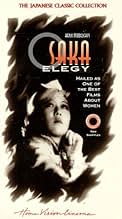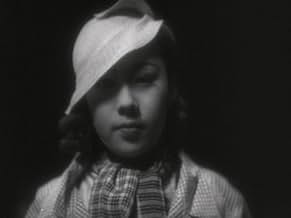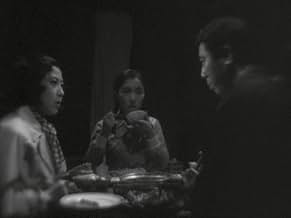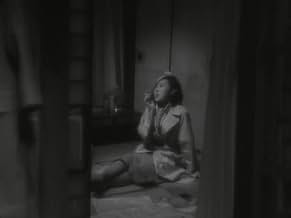Naniwa erejî
- 1936
- 1h 11min
CALIFICACIÓN DE IMDb
7.2/10
2.7 k
TU CALIFICACIÓN
Agrega una trama en tu idiomaA young woman becomes a mistress of her boss in order to support her family.A young woman becomes a mistress of her boss in order to support her family.A young woman becomes a mistress of her boss in order to support her family.
- Dirección
- Guionistas
- Elenco
Opiniones destacadas
This film begins with a relatively wealthy--but extremely grouchy--old man by the name of "Sonosuke Asai" (Benkei Shiganoya) harping on all those around him for very minor issues. It's during this time that his wife "Sumiko" (Yôko Umemura) sarcastically recommends that he gets himself a young mistress since he no longer finds her appealing. That being said, it just so happens that there is a young employee at his office named "Ayako Murai" (Isuzu Yamada) that he finds quite attractive and knowing that she is in desperate need of money due to a family matter offers her the unenviable position. In any case, faced with very little choice she reluctantly accepts his offer. Unfortunately, even though she tries to do what is best for her family, she soon discovers that she has lost the respect of everyone of any consequence to her. Now rather than reveal any more I will just say that I initially thought that this was a comedy as the first few scenes seemed rather light-hearted. But things change rather remarkably later on. On another note, it should be mentioned that silent films lasted a bit longer in Japan than most other industrialized nations and that this was one of the first pictures to utilize sound. Be that as it may, I thought that this was a pretty good movie and I have rated it accordingly. Above average.
The first film included in the Criterion Collewction's "Mizoguchi's Fallen Women", this is the story of Ayako (a pretty great Isuzu Yamada who, according to this website, is still wonderfully with us), who is a switchboard operator who needs 300 yen to prevent her father getting in major trouble. To get the money, she spends time with her boss. This is, of course, little more than being a companion. One of Mizoguchi's gifts as a director (he also wrote the story) is that in many of his films his characters were not sympathetic yet he does not wholly judge the. The key is, what would you do? The film could never be in color, it is a noirish, gray film. The story is compelling, the acting is uniformly good, with Ms. Yamada really standing out, and the direction is, of course, flawless. I've also seen "Sisters Of The Gion" and "Streets Of Shame" from this collection. Buy it! Mizoguchi was one of the giants of 20th century cinema from any country. This film is highly recommended.
Ayako (Isuzu Yamada) becomes the mistress of her boss, Mr. Asai, so she can pay her father's debt, and prevent him from going to prison for embezzlement. She also sends money to her brother Hiroshi to pay his university tuition, but her father intercepts it.
Mizoguchi considered the film his first serious effort as a director, and while I am not familiar with his earlier work, I have to say this is the kind of film that leaves a mark. Either Mizoguchi or his cinematographer had an excellent awareness of the camera -- the door closing to block the camera early on in the film -- years ahead of its time.
The subject matter in general is impressive. I am not sure what the typical morality was in pre-war Japan, but to feature adultery and whatnot in the 1930s seems quite bold.
Mizoguchi considered the film his first serious effort as a director, and while I am not familiar with his earlier work, I have to say this is the kind of film that leaves a mark. Either Mizoguchi or his cinematographer had an excellent awareness of the camera -- the door closing to block the camera early on in the film -- years ahead of its time.
The subject matter in general is impressive. I am not sure what the typical morality was in pre-war Japan, but to feature adultery and whatnot in the 1930s seems quite bold.
I believe the challenge here was to conceive of a film in terms of bunraku - the traditional Japanese puppet theater - and extrapolate from the environment a structure, so one stage where heightened drama unfolds, controlled, with a view of the mechanisms handling the illusion, and then a second stage on the side to supply a rotation of music and voice expressing emotion. This is very well thought out, something to keep in mind when viewing later Mizoguchi where melodrama lacks annotation.
This translates in our film as melodrama about a bold young woman who gambles away on her dignity and reputation because the world around her is desperate for either money or sex, the controlling mechanism is that only the viewer is in possession of all the facts and so is able to read tragic fate in every exchange. This has been noted by some viewers as film noir, because the woman appears to function as a femme fatale, but the Japanese have no affinity for this sort of trope.
So of course, in accordance with bunraku, the woman is a puppeteer but also herself a puppet, a figure on the same stage as the play she enacts, her movements subject to our scrutiny. You will note this in tandem with, and reversing, an earlier Mizoguchi - The Water Magician - about a water artist whose life is merged with the transitory flows she used to control.
This is beautifully rendered in a scene where she is caught with her boss on a night out to watch a bunraku play. She has set a plot in motion, attempting control, an active role, but unpredictable life foils her. The wife demands explanations but seems the most irate for noticing the hairstyle on the girl, signifying a married woman, her role on the stage being supplanted even though it's a loveless marriage and thankless role. Moments before, however, we have seen an excerpt from the play, where inside the artifice, the controlled fiction, it was the suspicious husband accusing the woman of adultery.
This would have an ordinary ironic effect if mapped cleanly to the situation outside the stage, but it doesn't, it's wholly asymmetrical, the tension all in the imbalance of familiar elements framed askew. You have to puzzle about assigning to the players the puppet-master's controls. This is the touch lacking in Ozu's Floating Weeds.
The music is not in the emotional after-effects of storytelling, this too part of the heightened artifice. The music is in the camera, caressing day from night.
This translates in our film as melodrama about a bold young woman who gambles away on her dignity and reputation because the world around her is desperate for either money or sex, the controlling mechanism is that only the viewer is in possession of all the facts and so is able to read tragic fate in every exchange. This has been noted by some viewers as film noir, because the woman appears to function as a femme fatale, but the Japanese have no affinity for this sort of trope.
So of course, in accordance with bunraku, the woman is a puppeteer but also herself a puppet, a figure on the same stage as the play she enacts, her movements subject to our scrutiny. You will note this in tandem with, and reversing, an earlier Mizoguchi - The Water Magician - about a water artist whose life is merged with the transitory flows she used to control.
This is beautifully rendered in a scene where she is caught with her boss on a night out to watch a bunraku play. She has set a plot in motion, attempting control, an active role, but unpredictable life foils her. The wife demands explanations but seems the most irate for noticing the hairstyle on the girl, signifying a married woman, her role on the stage being supplanted even though it's a loveless marriage and thankless role. Moments before, however, we have seen an excerpt from the play, where inside the artifice, the controlled fiction, it was the suspicious husband accusing the woman of adultery.
This would have an ordinary ironic effect if mapped cleanly to the situation outside the stage, but it doesn't, it's wholly asymmetrical, the tension all in the imbalance of familiar elements framed askew. You have to puzzle about assigning to the players the puppet-master's controls. This is the touch lacking in Ozu's Floating Weeds.
The music is not in the emotional after-effects of storytelling, this too part of the heightened artifice. The music is in the camera, caressing day from night.
"Osaka Elegy" (Japanese, 1936): Directed by Kenji Mizoguchi. This is one of his earliest films. Japan was in the throes of a cultural turmoil. They were busy invading China, and feeling the schizophrenia of traditional vs modern society. This story is about a decent young woman, who, when familial pressure is applied, does anything necessary to pay the bills of a pathetic father, a self-centered brother, and a confused, naïve sister, and, a keep an abusive boss "happy". As we might expect (now), her road darkens as everyone demands more and more, gives back less and less, and shuns her for doing what they suggested and made their advantage. Expect a noir-ish look to the film, with spare traditional home sets and costuming, contrasted with high style business/commercial sets and costuming.
¿Sabías que…?
- Citas
Junzo Murai: You're a woman... Being taken to the police station... Getting thrown into jail... You've done shameful things. You ungrateful child!
Ayako Murai: How could you say that? I never expected that I'd be treated like this when I came home. This is ridiculous! I thought you would welcome me with open arms. If I'd have known this, I never would have come back.
- ConexionesFeatured in Century of Cinema: Nihon eiga no hyaku nen (1995)
Selecciones populares
Inicia sesión para calificar y agrega a la lista de videos para obtener recomendaciones personalizadas
- How long is Osaka Elegy?Con tecnología de Alexa
Detalles
- Tiempo de ejecución
- 1h 11min(71 min)
- Color
- Mezcla de sonido
- Relación de aspecto
- 1.37 : 1
Contribuir a esta página
Sugiere una edición o agrega el contenido que falta













